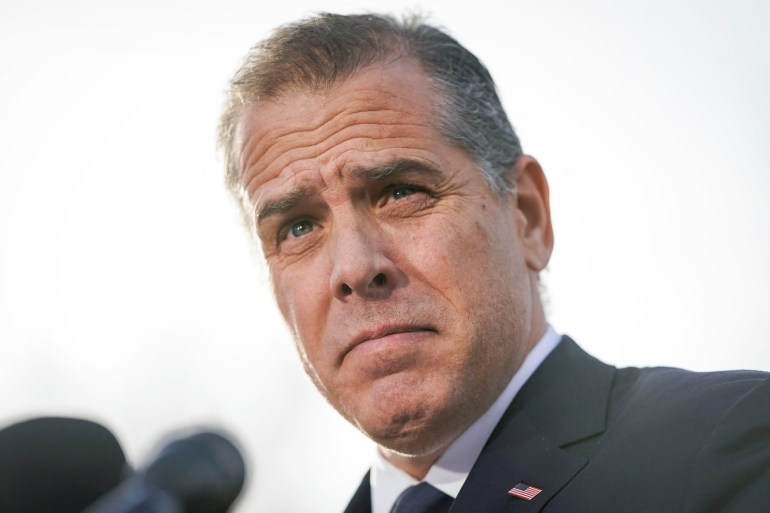The Republican-led United States House of Representatives has voted to formally authorise its impeachment inquiry into President Joe Biden.
Up until this point, the House had not had enough votes to legitimise the ongoing inquiry, but on Wednesday, lawmakers voted 221-212 in favour, with every Republican voting for it and every member of Biden’s Democratic Party against.
The decision to hold a vote came as Republican Speaker Mike Johnson and his team faced growing pressure to demonstrate progress in what has become a nearly yearlong probe into the business dealings of Biden’s family members.
The vote took place hours after his son Hunter Biden defied a congressional subpoena by failing to appear for a private deposition at the House of Representatives. He refused to testify behind closed doors, saying he would testify only in public because he feared his words would otherwise be misrepresented.
Here is what you need to know:
What is an impeachment inquiry?
An impeachment inquiry is a formal investigation into possible wrongdoing by a federal official, such as the president, cabinet officials or judges.
The process is written into the US Constitution and is the most powerful check that Congress has on the executive branch. It is a first step towards a potential impeachment, which means essentially that charges are brought against an official.
The US founders included impeachment in the constitution as an option for the removal of presidents, vice presidents and civil officers. Under the constitution, they can be removed from office for “treason, bribery, or other high crimes and misdemeanours”.
While the House of Representatives wields the power to impeach an official, only the Senate has the ability to convict and remove an individual from office. This played out recently when former President Donald Trump was impeached twice by the House but acquitted in the Senate.
To date, no president has ever been forced out of the White House through impeachment, but Joe Biden is the eighth president to face an impeachment inquiry. Only three other presidents have been impeached after an inquiry: Andrew Johnson, Bill Clinton and Trump.

Why is this happening now?
The House of Representatives started an impeachment inquiry in September, but the process has now been formalised.
In November, a top White House attorney claimed the investigation was illegitimate because the House had not yet formalised the impeachment inquiry through a vote. The White House questioned the legal and constitutional basis for the Republican lawmakers’ requests for information.
The constitution does not require a vote to start an impeachment inquiry, and neither do the rules governing the House, but authorising resolutions have been passed in previous presidential impeachments.
Most of the Republicans who were initially reluctant to back the impeachment push due to the lack of concrete evidence against the president have also been swayed by their leadership’s more recent argument that authorising the inquiry will give them better legal standing and would convince the White House to cooperate fully in the investigation by providing more information.
“This vote is not a vote to impeach President Biden,” Johnson said at a news conference on Tuesday. “This is a vote to continue the inquiry of impeachment. … I believe we’ll get every vote that we have.”
Congressional investigators have already obtained nearly 40,000 pages of subpoenaed bank records and dozens of hours of testimony from key witnesses, including from several high-ranking Department of Justice officials currently tasked with investigating Hunter Biden.
Is there enough evidence against Joe Biden?
Republicans have accused the president and his family of profiting from his time as vice president from 2009 to 2017 and have zeroed in on his son’s business activities.
Conservatives accuse Hunter Biden of “influence peddling”, effectively trading on the family name in “pay-to-play” schemes in his business dealings in Ukraine and China.
They have pointed to an FBI document from 2020 in which an informant claims the head of Burisma, a Ukrainian energy firm that included Hunter Biden on its board of directors, said: “It cost 5 (million) to pay one Biden, and 5 (million) to another Biden.”
This bribery claim relates to the Republican allegation that President Biden pressured Ukraine to fire its top prosecutor to stop an investigation into Burisma.
Democrats have reiterated that the Justice Department investigated the Burisma claim when Trump was president and closed the matter after eight months, finding “insufficient evidence” to pursue it further.
The head of Burisma, Mykola Zlochevsky, has said nobody from the company had any contact with Joe Biden or his staff and that the elder Biden “did not help the firm”.

Devon Archer, a business associate of Hunter Biden, told the House Oversight Committee in July that the younger Biden had sought to create “an illusion of access to his father” and put his father on the phone with foreign associates “maybe 20 times” over the course of about 10 years.
Archer said those conversations did not involve any business dealings, however, and he was not aware of any wrongdoing by President Biden.

Hunter Biden faces an array of legal woes. In September, prosecutors with US Special Counsel David Weiss’s office charged him with making false statements about illegal drug use while buying a firearm. And last week, a grand jury indicted Hunter Biden for tax offences.
He has pleaded not guilty to the three federal gun charges, and his lawyer says he has paid his taxes in full.
“There is no evidence to support the allegations that my father was financially involved in my business because it did not happen,” Hunter Biden told reporters outside the US Capitol on Wednesday.
After he defied their subpoena, members of the House Oversight Committee said they would take steps to hold him in contempt of Congress, which could potentially result in prison time.

Could President Biden be removed from office?
Analysts said the Republican effort will almost certainly fail to remove Joe Biden from office. Even if the House achieves the simple majority required to impeach the president, the Senate would then have to vote to convict him on the charges by a two-thirds vote – a near impossibility in a chamber where the Democrats hold a 51-49 majority.
But going through the process of an impeachment investigation could help Republicans highlight their allegations of corruption through much of the 2024 election campaign, in which President Biden is running for re-election. It will also allow the three Republican-controlled House committees leading the inquiry to subpoena documents and testimony – and allow judges to enforce those requests.
“Since September, the House has been engaged in an impeachment inquiry,” Representative Tom Cole said on Wednesday. “Today’s resolution simply formalises that inquiry and grants the House full authority to enforce its subpoenas that have been denied as recently as today.”
President Biden also responded to Wednesday’s vote: “Instead of doing anything to help make Americans’ lives better, they are focused on attacking me with lies. Instead of doing their job on the urgent work that needs to be done, they are choosing to waste time on this baseless political stunt that even Republicans in Congress admit is not supported by facts.”










